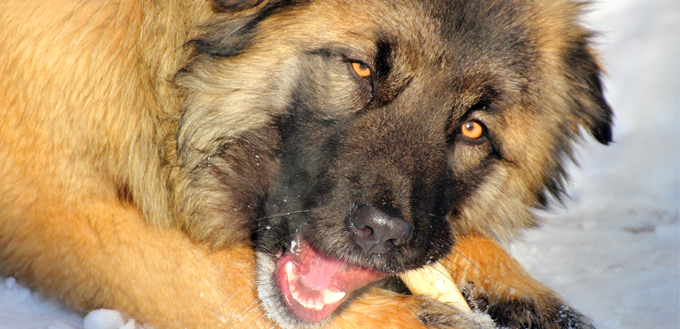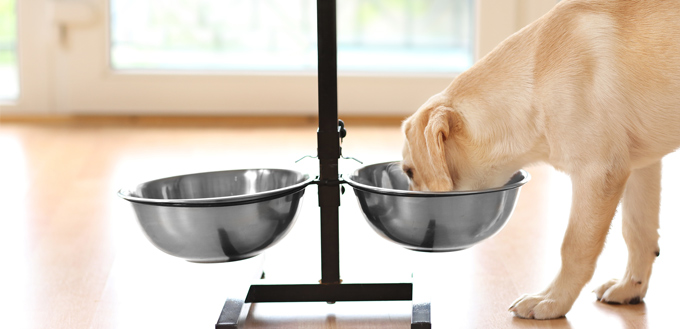Unquestionably, fats, and oils are an essential part of your dog’s diet. We’ve always known that a diet that contains about 10 to 15 percent fat is optimal for little dog’s health and especially for healthy adult dogs. What causes the problem is when you allow your pet dog to take in too many calories and fat. Now, how much is too much? We’d say, the fat derived from extra treats and those leftovers at your kitchen that your dog loves to gulp down is what is called excessive fats. On top of that, if your fellow is not getting enough workout and exercise to balance things out, it might get worse.
In this guide, we’ve outlined the fats and oils that are particularly necessary for your pet dog and we’ll also discuss the best ways to feed fats to your dog.
But first things first…

What are Fats?
Fats are a natural form of concentrated energy that gives your dog thrice the amount of energy as proteins and carbohydrates do. However, you need not worry about the fats that the dog foods contain as they are highly digestible. Your dog’s body will make use of the energy derived from those nutrients, before proteins and carbohydrates. Fatty acids such as omega-3 and omega-6 are essential in your dog’s diet. These are a must for your dog’s regular diet and should be provided in a balanced ratio in their everyday diet.
What do these Fats do for Canines?
Fats definitely have an important role to play when it comes to really important functions in your dog’s body. They provide energy and also help in developing the body cells, tissues, nerves, and muscles. Additionally, they are also an important element in the production of prostaglandins, a hormone-like substance that helps in reducing inflammation and boost overall performance effectively.
Fats are also the reason why your pet’s food smell and taste great (at least to your little pupper!). In fact, fats and oils are an important dietary staple of dog foods. It helps their body to take in certain vitamins known as fat-soluble vitamins (A, D, E, and K). With a balanced amount of fat added to your pet dog’s everyday diet, their coat is likely to be shinier and healthier. But be careful about what you serve your furry friend. Not all types of fats and oils are good for your pets. Quality, quantity, and source are important factors to consider when choosing a dog food.
The BIG Question, Can I Give Fat to My Dog?
The answer is: YES! Interestingly enough, it’s really important for dogs to receive fat from meat protein than the fat trimmings. A moderate amount of fat in their daily diet would be really beneficial, making their coat noticeably smooth and shiny. Just remember not to overdo it. Always remember to keep trans-fat away.
However, you don’t necessarily need to worry about saturated fats. Dogs aren’t really open to high cholesterol heart diseases, or any other coronary risks because of the amount of exercise and running that they do all throughout their day.
Natural Fat vs. Processed Fat
When it comes to natural fats, almost every other fat is suitable. Prime examples of this would be a little amount of beef fat and steak fat. A small amount of tallow and grease from rendered fat is not really harmful at all if you can really balance out the amount and give it to them occasionally. However, this doesn’t make fat a meal. Just a lean meat would suffice than a huge amount of fat.
When serving your pet, always avoid junk, fatty foods. In fact, drop the idea of feeding your little buddy processed food products.
Common Origins of Oils and Fats for Dogs
Suppose you are out grocery shopping and you suddenly stumble upon the pet food shelf, each brand having their own promotions. It’s very likely for you to pick up the cheapest and greatest deal of them all. We wouldn’t say you’re wrong, but considering the best for your pet dog, we’d recommend you to check the ingredients list for at least once to see what type of fat and oil are used in that particular pack. In addition, do check the sources of fats and oils too. But you must be wondering why? That’s because, as we’ve mentioned earlier, the quality and source of fat is an important factor to consider when choosing dog food. Fats and oils in dog foods are taken from both animals and plants. Therefore, a standard quality food will have a proper balance of fatty acids like omega-3 and omega-6.
More often than not, usual sources of omega-3 fatty acids are fish oil, canola oil, and flaxseed, while omega-6 is obtained from chicken fat, pork fat, sunflower, and safflower oil and corn and soybean oils (specifically known as vegetable oils). Do look out for low-quality ingredients such as lard or tallow.

Some Healthy Oils to Add to Your Dog’s Diet
- Fish Oil: We all are aware of the fact that fish oil contains omega-3. But did you know that it contains EPA and DHA that have some anti-cancer effects as well as help arthritis? Adding a little amount of fish oil to your pooch’s diet would also improve their memory. Most importantly, the omega-3 present in fish oil acts as a natural anti-inflammatory effect that helps in reducing the overall inflammation in the dog’s body and thus decreasing their reliance on drugs aimed at reducing inflammation and pain.
- Krill Oil: Compared with the fact that fish oil comes from fish that are higher on the food chain like salmon, krill oil is derived from small-scale shrimp-like organisms that can be classified as a little lower. Thus, krill oil is not likely to be adulterated with mercury. It also contains EPA and DHA that will certainly give your pet dog a healthier joint and shinier coat along with the other benefits that it carries. Your dog is more likely to best absorb non-vegetarian based substances such as fish and krill oil because of the omnivores creatures that they are.
- Coconut Oil: Undoubtedly, coconut oil one of the most beneficial oils of all time. This extra-virgin oil is increasingly becoming a popular choice for our pet dogs because we know how healthy it can be than those much processed saturated and trans fats. Surprisingly, it proves to be a great remedy for dog’s weight loss by giving them more energy for exercise. It also relieves them from dry skin. One brand new piece of information that we’d provide you with is, it improves your canine’s oral health by alleviating their bad breath.
- Flaxseed oil: If you’re not sure about what’s flaxseed oil, well, know that it’s one of the world’s first cultured superfoods. It has another name called linseeds and is brown, tan, or golden in color. The oil processed from flaxseed is colorless to yellowish and does have its own benefits for your canine. The good amount of alpha-linolenic omega-3s in flaxseed puts in the same ground as wild fish when the question arises about improving heart health. Just like the other nourishing oils that we discussed previously, flaxseed oil also helps with mobility for arthritic dogs and certainly helps in functioning the kidney better by controlling blood pressures.
- Pumpkin Seeds and Hemp Oil: Do you need to supplement omega-6 fatty acids to your pet dog’s diet? Usually, dog owners who feed a homemade diet prefer vegetarian oils like pumpkin seeds and hemp over other sources like corn oil, olive oil or safflower oil. If your dog’s diet lack omega-6 fats, it might result in poor development in general and result in them being raw-boned.
Related Post: CBD Hemp Oil for Dogs
If your pet’s diet lack omega-6, it can cause kidney and liver degeneration. More signs of omega-6 deficiency include:
- Behavioral issues
- Bad wound healing
- Miscarriage
- Infertility in male dogs
Although it’s very rare for dogs to have omega-6 deficiencies because the pet foods already contain little to high amount of these fats. It’s best to give your canines animal-based fat sources like fish or krill oil. They cannot really convert plant-based of omega-3 into proper amounts of EPA and DHA.
How to Serve These Healthy Oils to Canines?
These oils are available in jars or even as capsules. The problem with jars is that, once you open it and it’s revealed to the air, it can become sour and stale. Experts say that capsules are a step ahead in that case. You could feed them capsules by piercing it and squeezing it onto their moist food or a treat. Dog enthusiasts came up to the conclusion that capsules are best consumed out of moist food.
You May Also Like: Dog Pill Shooter
But it also depends on what your dog prefers. Most hearty-eating canines would gulp down a capsule out of their curiosity. However, if you feel that they are being a bit reluctant to swallow the capsule, mix those liquid oils with their wet food. You might as well pour a little bit of the oil over their dry food.
Why Fat is Actually Good for Your Dog:
Surely, there are bad “fats”, but if you can identify the right type of fat for your dog, it would be extremely beneficial for their diet. Here are some benefits that your canine would experience if they consume a certain limited amount of fat.
You know that when you provide your canine with the right amount and type of fat, it helps to meet their metabolic needs. And there’s no question as to how fats are important for their good health and survival. Own a husky? Well, fat is what would keep your husky’s fur, eyes, skin, coat, brain, blood cells and immune system all in-shape.
Another thing is that if you are residing in a colder climate, chances are that a subtle amount of fat would keep your pet dog warm and provide them with the stamina to adjust to the cold breeze. Racing longer distances and running/hiking with your pet dog in the snow will become so much fun!
What if These Oils Have an Adverse Effect on My Dog?
It’s no surprise that excess of anything wouldn’t cause harm. Similarly, too much of any of these oils will cause weight gain in canines. A big dose of oil might be the cause of pancreatitis in dogs, especially if they are already overweight. Excessive oil consumption may also lead to a deficiency in vitamin-E if it is not supplemented properly with another additional Vitamin-E. One thing you should take care of is, if your furry friend underwent surgery in recent days, you might need to stop continuing giving them fish oil as it prolongs the time taken for blood clotting. As per experts, it’s best to stop serving them fish oil for at least five days before and after the surgery.

Bottom Line
Lately, there has been a lot of confusion about this issue of feeding fats and oils to your furry friend. It all arose because of so many different types of fats available nowadays. And it’s completely understandable if you’re confused. What we’d recommend is to first find out which type and how much of fat you need to provide your dog with.
Giving them pure meat or lard cannot compare to the kind of processed junk foods. However, supplementing omega-3 and omega-6 fatty acids are another scenario. If you’re contemplating that your dog might experience a kidney failure, pancreatic issues or liver damage, it will not take place at all if you don’t overdo any of these fatty acids.
Therefore, feed fats and oils in moderation. Pancreatitis is the topmost concern when feeding fats to your dog. Other than that, you’re good to go with any type of fat that you think is good for your little one (except processed foods).






